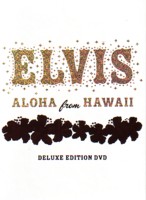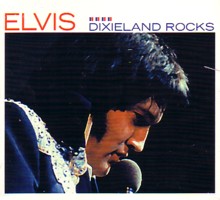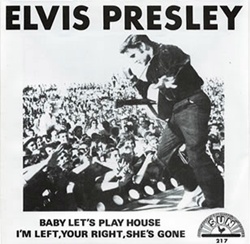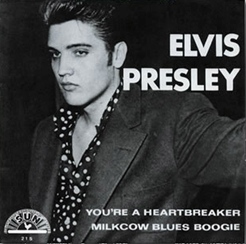Fourteen Key Elvis Singles
As chosen by author Dave Marsh
- EIN Spotlight compiled by Piers Beagley
|
Dave Marsh is a respected rock critic and historian who has written more than 20 books about rock music and popular culture.
In 1982 Marsh published his excellent book 'Elvis' where he discarded the prevalent extreme myths about Presley and presented the truth about the reclusive, contradictory, and endlessly fascinating man.
In 1989 Dave Marsh published the fascinating book for music aficionados "The Heart of Rock & Soul: The 1001 Greatest Singles Ever Made".
It is a fascinating exploration of some of the greatest music of all time and of course ELVIS is heavily featured.
The particular 14 singles that Marsh selected as his key Elvis songs are a very interesting choice and his essays about each track are well worth reading.
EIN's Piers Beagley shines a spotlight on this fascinating book as well as Marsh's selection of classic Elvis tracks...
|
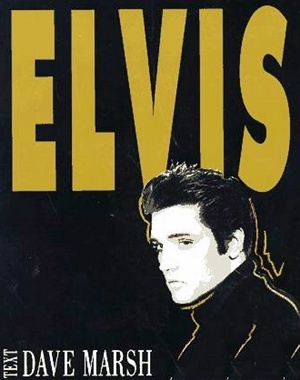 |
Elvis Presley was an explorer of vast new landscapes of dream and illusion. He was a man who refused to be told that the best of his dreams would not come true, who refused to be defined by anyone else's conceptions. This is the goal of democracy, the journey on which every prospective American hero sets out. That Elvis made so much of the journey on his own is reason enough to remember him with the honor and love we reserve for the bravest among us. Such men made the only maps we can trust.
- Dave Marsh - " Elvis" (Rolling Stone Press, 1982) |
Dave Marsh is a respected rock critic, historian, anticensorship activist who has written more than 20 books about rock music and popular culture. He co-founded legendary rock and roll magazine 'Creem' and spent five years as an editor of Rolling Stone, where he was chief music critic and feature writer. From 1985-2002 he served as music critic for Playboy. He has lectured widely on music, politics, and censorship.
In 1982 Marsh published his excellent book 'Elvis' where… "Marsh discards the prevalent extreme myths about Presley and presents the truth about the reclusive, contradictory, and endlessly fascinating man."
He also authored the detailed liner notes for the BMG ‘Walk a Mile in My Shoes: The Essential 70s Masters’ 5CD boxset as well the 'Elvis Goes Global' essay for the deluxe "Aloha From Hawaii" DVD.
In 1989 Dave March published the fascinating book for music aficionados "The Heart of Rock & Soul: The 1001 Greatest Singles Ever Made".
In the book Marsh offered a passionate guide to his choice of the 1,001 greatest rock and soul singles ever made, encompassing rock, metal, R&B, disco, folk, funk, punk, reggae, rap, soul, country, and any other music that has made a difference over the past fifty years. The illuminating essays doubled as a mini-history of popular music.
It is a fascinating exploration of some of the greatest music of all time and of course ELVIS is heavily featured.
The particular singles that Marsh selected as his key Elvis songs are a very interesting choice and his essays about each track are well worth reading.
|
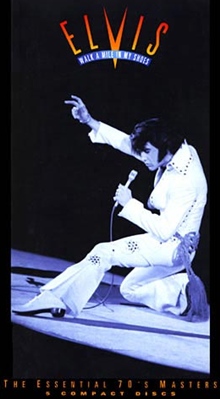 |
In his opening notes for "The 1001 Greatest Singles" book he wrote....
... Singles are the essence of rock and roll. They occupy the center of the pop music that came after it. They're the stuff of our everyday conversations and debates about music, the totems that trigger our memories. Everybody who listens with half an ear must know this.
After World War II, as recording studio technology played a more and more instrumental role in crafting sounds for mass consumption, the writer-performer became the true star. Elvis Presley was the great exception among the big stars of the fifties and sixties because he never wrote a song.
For some years, Elvis’ reputation suffered because of his lack of composing ability, but that opinion had to be overturned as closer observation revealed that his revamping of songs such as "Blue Suede Shoes," "Mystery Train," "Blue Moon of Kentucky," and arguably, even European and Broadway themes like "It's Now or Never," "Are You Lonesome Tonight," and "Blue Moon" constituted a form of writing. |
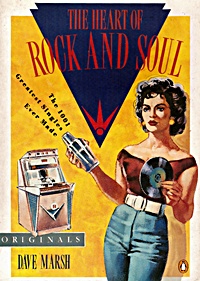 |
The record industry and music critics continue to be heavily biased in favour of writers. Since the Beatles, it has been all but impossible for non-writing performers to be taken seriously, as though only through songwriting can a singer or musician have a central hand in shaping his or her music, a concept that has been outmoded at least since the invention of overdubbing and possibly since the development of good studio microphones."
The TOP TEN singles in the book are..
1. Marvin Gaye - I Heard It Through The Grapevine
2. Chuck Berry - Johnny B. Goode
3. James Brown - Papa's Got A Brand New Bag
4. Four Tops - Reach Out I'll Be There Motown 1966
5. Righteous Brothers- You've Lost That Lovin' Feelin'
6. Rolling Stones - I Can't Get No Satisfaction
7. Bob Dylan - Like A Rolling Stone
8. Aretha Franklin - Respect
9. Little Richard - Tutti Frutti
10. Martha And The Vandellas - Nowhere To Run
11. Kingsmen - Louie Louie
12. Elvis Presley - Mystery Train
- But Elvis fans should not take to heart that our hero first appears only at #12 and that "Hound Dog’ comes it at #966.
Elvis has more singles that The Beatles in the 1001 – more singles than any other performer.
It has to be noted that this is a book, NOT a "best-of" list. All sorts of factors came into play: the need to cover certain stylistic bases, a desire not to crowd too many entries by the same artist too closely together, the necessity of making what did originate as a list into a book that flowed along its own path.
Here then is Dave Marsh's selection of his key fourteen Elvis Singles - as chosen in 1989.
At #12 - MYSTERY TRAIN
What's scary about the young Elvis is his assurance, the complete ease with which he swings into action. Here, singing a song in which R&B singer Junior Parker reworked the folk images from country songs like the Carter Family's "Worried Man Blues," Elvis rides an urgent Scotty Moore guitar lick and propulsive Bill Black bass line with complete confidence: He owns the song and nothing within it is unknowable to him or could ever betray him. Which is pretty weird because he's singing about something close to a death ship, a "long black train got my baby and gone," which may also be looking to snatch him. By the end, he's persuaded himself—and you, too—that it's bringing her back.
The recording itself is a masterpiece, the sound virtually liquid as it hits the ear, the legendary Sun echo fine-tuned like a Ferrari. Junior Parker's version, a minor R&B hit in 1953, is spooky because it details' what fate can do to a man. Elvis makes you want to defy all omens, hie to the graveyard and dance fearlessly at midnight. |
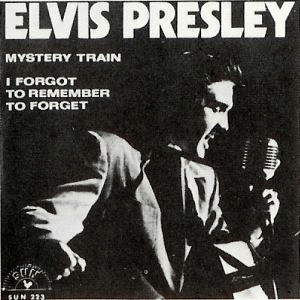 |
.
GOOD ROCKIN' TONIGHT,
"That's All Right" Elvis's first single, might have been a fluke. But 'Good Rockin' Tonight' was more of the same, and better, establishing that all concerned — Scotty Moore, Bill Black, Sam Phillips, but especially Elvis himself — knew exactly what they were up to and, indeed, had already created a new and improved model. Thirty years later 'Good Rockin' Tonight' still sounds like what's about to happen.
Elvis wrote no songs, and none of his Sun Records material was written for him. In fact, the best of his Sun songs had already been hits for others. Of them all, only "Good Rockin' Tonight" was already great, having been done superbly in the late forties both by author Brown and by Wynonie Harris, the most famous blues shouter of the period.
If you're sufficiently familiar with Brown's style, you'll easily spot his influence. But it's still hard to believe that this is the same song, not because Elvis's version is particularly country and God knows, not because he rocks harder — try rocking harder than Wynonie Harris and you'll rupture something.
Some of the differences are in the arrangement, with Bill Black's rubbery bass and Scotty Moore's stinging guitar replacing the original, horn-based jump blues patterns. But the difference that counts is Elvis. This was only his second single, but he'd already established his weird mixture of ferocious self-confidence and complete easefulness, and he sings "Good Rockin' Tonight" as if he's inventing it. Which for all practical purposes he is. By the time he gets to the repetitions of "rock" which close out the record, Elvis has crossed over into glory. |
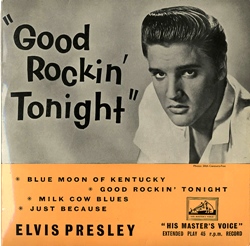 |
.
DON'T BE CRUEL
That easy Elvis style this time wears a great song the way some guys can shrug into a $1,000 suit. Mostly, the King lays back and lets his supporting cast show their stuff: Bill Black with a virtual bass solo at the top, D.J. Fontana popping the backbeat, the Jordanaires crooning like rock's first barbershop harmony team, Scotty Moore sketching in some guitar here and there.
You could almost swear that Elvis wasn't doing anything except riding a perfectly constructed machine. But then he slides into a "mmmmm" that marks the transition between the first two verses, and you realize how masterful his relaxed style really is. The Big Bopper built an entire hit record around that tossed-off "mmmmm" but Elvis moves on as if it barely mattered. That's cool. |
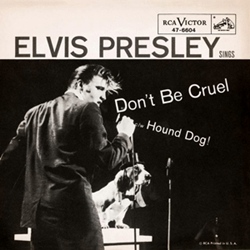 |
.
THAT'S ALL RIGHT
How well does this Rosetta stone, Presley's first single, a regional but not national hit, recorded meticulously over many hours of studio experimentation by a group of four men (Elvis, producer Phillips, guitarist Scotty Moore, and bassist Bill Black) fit the key elements of the rock myth? Well, it wasn't spontaneous; it was as closely calculated as a fixed fight. Nor is its sound anarchic and rebellious or its tempo particularly fast. After all these years the most impressive characteristic of "That's All Right" is the way Presley projects such complete drive with so little audible effort. But the triumph isn't his alone. The sound is crystalline, the balance is exquisite, Bill Black's bass has its own ever present assurance, and Moore's guitar — especially the solo — toughens the song up and forces it to rock. Nor is this music quite what any black bluesman or any country singer would ever have come up with.
In short, "That's Alright" does the same thing now that it did then: explodes preconceptions and replaces them with something better. |
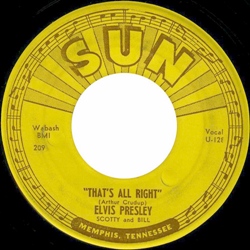 |
.
SUSPICIOUS MINDS
Elvis' last Number One was also his one great modern record. Exciting in its own right as an interpretation of soul music — hillbilly Jerry Butler more or less — "Suspicious Minds" also makes a formidable argument for Elvis-as-artist, despite all the wasted years in Hollywood. However minor and incremental, Presley's creative growth can be heard in the thoughtful reading he gives this song. Maybe he put so because the lyric was halfway autobiographical, but he couldn't have communicated even that if he hadn't been completely in command of his musical faculties. So here's the final piece of evidence that what happened at Sun was no fluke.
(- Also go here EIN' spotlight 'Suspicious Minds' - Elvis' Greatest Single?) |
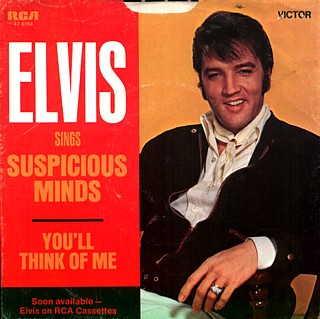 |
.
LITTLE SISTER
Scotty Moore comes up with his greatest post-Sun guitar lick and not only converts a comparatively humdrum Pomus-Shuman teen love triangle number into the best of Elvis' early sixties hits, but (together with D.J. Fontana's heavy-footed thunderation) gives more than a few pointers toward the metallic rock to come. In other words if the Who had been capable of rockabilly, "Little Sister" is what they would have come up with.
|
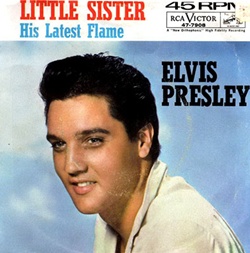 |
BABY LET'S PLAY HOUSE
In which Elvis introduces two central rock and roll concepts: the vocal stutter and the lust for the Pink Cadillac. Other than that, it's guitarist Scotty Moore's show, and he sets a few precedents of his own.
MILKCOW BLUES BOOGIE,
Going on thirty-five years later, and it still works - that corny false start, Elvis mewling like some hokey country bluesman (see, he could have gone to Harvard), then breaking off to command, "Hold it, fellas, that don't move me. Let's get real, real gone for a change," before crashing into a jumped up, hiccuping version of the same tune. Had Sam Phillips subtitled it "History Lesson Number One," the point couldn't have been clearer. Or more irrefutable.
BLUE MOON OF KENTUCKY,
High lonesome with ants in its pants. If you don't think Elvis' expropriation of country standards like this was as audacious as his blues reworkings, you haven't grasped the barricades the Nashville establishment can throw in the way of change to this very day. With its gutbucket bass and rocketing guitar solos and that relentless rattling — probably Elvis banging on the body of his guitar "like it was the lid of a garbage can," as he once described it — "Blue Moon of Kentucky" radically recasts one of the most sacrosanct numbers in all bluegrass. And bluegrass, though actually the product of a synthesis that Bill Monroe pioneered with as much calculation as Sam Phillips did rockabilly, has such ancient roots that it is regarded in country circles as the untouchable Ur music.
No wonder Nashville had to fight him off. The moment Elvis broke through, the die was cast and in fact, the country market suffered far more in the face of white rock's onslaught than the R&B market ever did. Great country was being made in 1954, but to admit Elvis to the C&W charts was an acknowledgment that there was an essential vitality missing from all of it. Sure as the governor of Mississippi had to bar that schoolhouse door, country had to hold off the facts (and they're the same facts) as long as it could. |
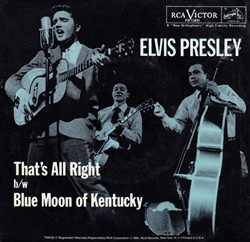 |
.
U.S. MALE
They say that Elvis Presley's late sixties comeback — the greatest artistic resurrection in show biz history — began with his TV special at Christmastime in 1968. But for me, he'd already been all the way back for six or eight months by then. I first heard "U.S. Male" shivering in a car that March, while cutting class for a long lunch, and immediately knew that that his voice had returned with a force that it hadn't had for years. More than anything else, "U.S. Male" restored to Elvis the very Southernness that the movies denied him. And with that restoration, his mythic power was also reborn.
"Now I'm a U.S. male 'cause I was born," he began, as the Jordanaires hummed a chord behind him,
"in a Miss'ssippi town on a Sunday morn.
Now Miss'ssippi just happens to occupy a place,
in the Southeastern portion of this here U-nited States.
Now that's a matter of fact, buddy, and you know it well.
So I just call myself the U.S. male."
|
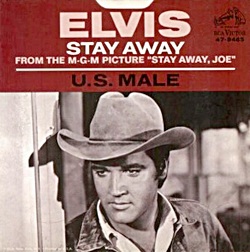 |
Jerry Reed's country boogie guitar jangled. "That's m-a-l-e, son. That's me." Then the tempo picked up and Elvis stunned me: He started to sing, bearing down on the hard guy lyrics, not sending them up or overplaying them but tossing them around with that astonishingly tough yet gentle assurance that he brought to his Sun records.
I'm not saying "U.S. Male" was really as good as his fifties hits, or that Elvis didn't do better on the TV show and in the records that followed the special. But what he did on "U.S. Male" cut to the heart of who he was, acknowledged who we wanted him to be, and toyed with the discrepancy.
Although "U.S. Male" wasn't a chart-topper (and chart-topping was intrinsic to full Elvishood), it remains a fascinating first step back. For even if what you remembered best about Elvis was not his musicality but his physicality, the distinguishing mark of that physicality was the half-conscious sneer that marked him as a hillbilly punk and proud of it. And not only is that exactly the character "U.S. Male" is about, by the time he's finished with that introduction — by the time he coolly pronounces, "That's me" — you can feel the sneer in a way that no other Elvis record delivers quite so forcefully.
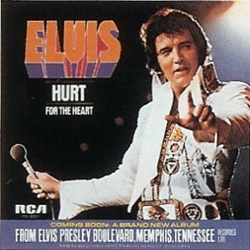 |
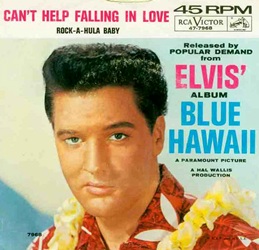 |
HURT
Elvis' last great bellow. If he felt the way he sounded, the wonder isn’t that he had only a year left to live but that he managed to survive that long.
CAN'T HELP FALLING IN LOVE
When Elvis first showed up at Sun Records, Sam Phillips asked him what he sang. "I sing all kinds," Elvis replied, and he meant it. Phillips says that Presley's ambition at the time was not to sing anything new but to sing exactly what the singers he liked on the radio and the jukeboxes were doing. After he left Sun and Phillips for RCA and went to Hollywood to make thirty-odd movie soundtracks, Elvis not only got to sing what he wanted, his way (which in the end bore precious little relationship to any previous pop singer), he sang a lot of material on which even his most indiscriminate hero, Dean Martin, might have gagged.
One thing that meant was the occasional reworking of a classical theme, and if this was done with any sensitivity at all, Elvis always shone. RCA staffers Hugo and Luigi (Sam Cooke's studio assistants during his days there) and George Weiss came up with "Can't Help Falling in Love" for the soundtrack of Blue Hawaii, Elvis' biggest ever movie, by adapting "Plaisir d'Amour," an eighteenth century melody by Italian composer Giovanni Martini.
Out of this funklessness, Elvis fashioned one of the great ballad performances of his career, singing with such gentle insistence and delicacy of phrasing ("Shall I stay" pronounced as if the words are fragile as crystal) that the corniness of the arrangement, with the Jordanaires mixed too high in the background and a steel guitar intruding on everything, makes little or no difference.
What's most persuasive of all, perhaps, is the song's utter fatalism. Years later, when he used "Can't Help Falling in Love" to end every one of his concerts, the song was a kind of joke, or at least Elvis' ironic commentary on how people seemed to feel about him. But in the original rendition, the song seems less like a gag than a confession of Presley's complete surrender to the whims of forces greater than he can comprehend. "Like the river flows, surely to the sea / Darling so it goes, some things are meant to be" is not a declaration of devotion, but an acknowledgement of powerlessness. Whether true or not, this is what Elvis Presley believed and that is why he renders the song with such tremendous conviction.
.
JAILHOUSE ROCK
An enduring smash for at least three reasons: the great walking bass, Scotty Moore's invention of power chording, and D.J. Fontana's drumming, which is halfway between strip joint rhumba and the perfect New Orleans shuffle.
Elvis, meanwhile, is so wrapped up in making his own noise that he approaches Leiber and Stoller's odd lyric without reservation. Odd because, given the strictures of the white rock market, they had to have a romantic theme, but prisons are not sexually integrated. So we get "Number 47 said to Number 3 / You're the cutest jailbird I ever did see."
That this is anomaly, not Freudian revelation, is evidenced by the wholeheartedness with which Presley sings the lyric. In this society, if those words reflected "real" homosexuality, they would assuredly require some distancing mechanism . . . and Elvis doesn't even try, just throws himself straight at the song, not in the spirit of camp but with all the childlike fascination he brought to his first movies.
What's most annoying is that if Elvis hadn't been viciously smeared in the press ever since his death, we could just make the joke and leave this rather obvious analysis alone. Or maybe get to a more central point, such as the idea that for Elvis (at least during the fifties), every situation was charged with enormous sexual/musical energy, with little need to discriminate between one and the other. |
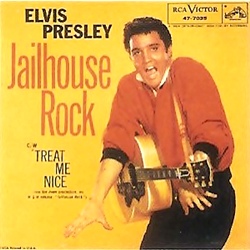 |
.
Finally at #966 - HOUND DOG
The final measure of Elvis Presley's Top 40 genius: He topped the charts for almost three months with a souvenir he brought back as a joke from his first trip to Las Vegas (otherwise the most disastrous junket of his career). And from that day to this, hardly anybody has known the difference.
"Hound Dog" was written by Jerry Leiber and Mike Stoller at the request of bandleader Johnny Otis, who gave it over to blues shouter Big Mama Thornton, then working as part of his revue. Houston-based Don Robey's Peacock label issued it in March 1953, and Thornton's "Hound Dog" spent seven weeks atop the R&B chart.
"Hound Dog" is probably the greatest example ever of the unfairness of presuming that all black R&B originals are better than later reinterpretations by white artists. Elvis has for years been saddled with charges that he ripped off Thornton, even though: 1) his arrangement owes next to nothing to hers, as both the music and lyrics are utterly different; and 2) he sings the hell out of the song while Thornton lumbers through it.
But mainly only blues purists, not inclined to cut Elvis or anyone like him a break, have actually heard Thornton's record, though not only purists have leveled the charge. |
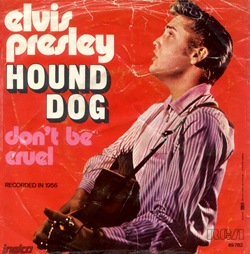 |
Student of R&B that he was, Elvis undoubtedly knew Thornton's record but he apparently never thought of singing "Hound Dog" himself until he happened upon Freddy Bell and the Bell Boys out in Vegas, where Elvis was also working in April of 1956. Bell and his group, one of the first lounge acts to successfully incorporate rock and roll, did "Hound Dog" as an R&B travesty, and Presley and his friends got the joke.
They could hardly have missed it since the very countrified ways at which Bell was poking fun were causing the greatest bomb of Elvis' career, when he was virtually hooted out of the Frontier main room and forced to cancel the final week of his booking.
Bell had totally rearranged "Hound Dog," livening the tempo and coming up with some new lyrics (including "You ain't never caught a rabbit"). Presley took his reading nationwide on June 5, during his national TV appearance on Milton Berle's show. Rapt in his rendition, he thrust his pelvis and wiggled his hips to almost catastrophic effect; it was this performance more than any other that caused the nationwide uproar over his "lewdness." But looking back on it now, what burns from Presley's face is humor he can barely keep from cracking up at his own jive.
"Hound Dog" was obviously a dangerous song and Elvis was reluctant to record it, especially after the unpleasant experience of being forced to don a tuxedo and sing "You ain't never caught a rabbit" into the face of a basset hound by jackass talk show host Steve Allen. Whatever his qualms, though, Elvis generally followed orders and the very day after his humiliation by Allen, he cut "Hound Dog" along with "Don't Be Cruel" at RCA's New York studio.
The "Hound Dog" that resulted is a funny, appealing record and Scotty Moore's scything guitar is no joke at all. It's sad that such a good example of Presley's willingness to laugh at himself and the sounds he loved has been so often used as a bludgeon by know-nothings.
EIN Website content © Copyright the Elvis Information Network.
Elvis Presley, Elvis and Graceland are trademarks of Elvis Presley Enterprises.
The Elvis Information Network has been running since 1986 and is an EPE officially recognised Elvis fan club.
|
|



